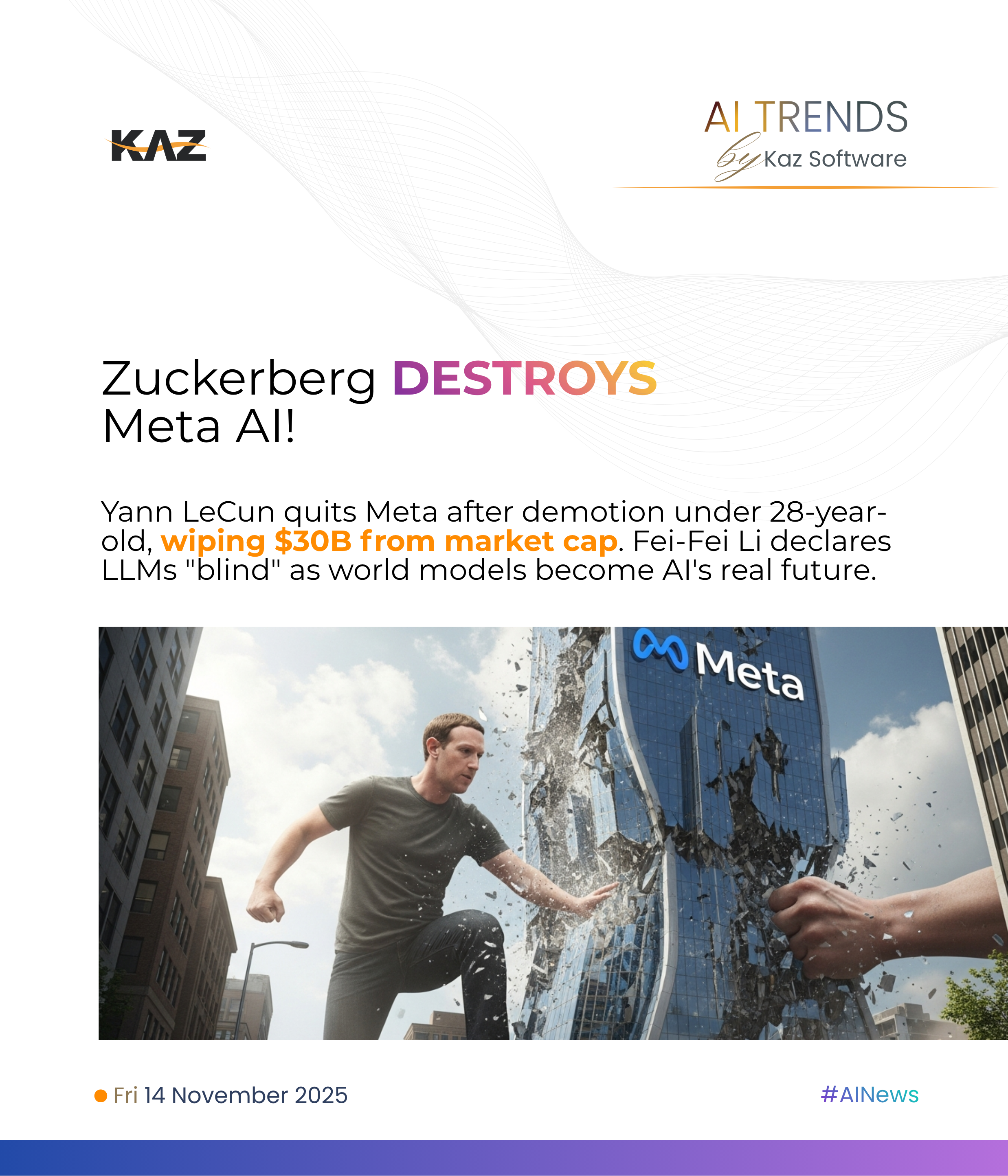Meta loses AI godfather in catastrophic meltdown
/Meta's AI godfather Yann LeCun QUITS after being forced under 28-year-old boss. $30B wiped from market cap. Meanwhile Fei-Fei Li says LLMs are "wordsmiths in the dark."
Yann LeCun quits Meta after being forced under 28-year-old boss, wiping $30B off market cap. Fei-Fei Li says LLMs are "wordsmiths in the dark" as world models become AI's real future.
Meta's AI empire collapsed as Yann LeCun, their chief AI scientist since 2013 and Turing Award winner, quit after Mark Zuckerberg forced him to report to 28-year-old Alexander Wang. The departure wiped $30 billion off Meta's market cap—twice what they paid to acquire Wang. Meanwhile, Fei-Fei Li's new essay declares LLMs are "wordsmiths in the dark" and that spatial intelligence through world models represents AI's actual future, vindicating LeCun's decade-long criticism that current AI is "dumber than a cat."
LeCun rage-quits after Zuckerberg makes him report to 28-year-old
The humiliation was complete when Zuckerberg hired Alexander Wang—the "hot dog, not hot dog guy from Silicon Valley"—and made LeCun, a Turing Award winner who pioneered modern AI, report to someone who could be his grandson. LeCun had built Meta's entire AI foundation through FAIR lab since 2013, created the Llama models, and established Meta's open-source dominance. His reward? Being demoted under a 28-year-old whose main qualification was running Scale AI, while his FAIR lab got stripped of resources and personnel for Wang's new "Super Intelligence Division."
The market's reaction was brutal: $30 billion vanished from Meta's valuation in hours, approximately twice what they paid to poach Wang from Scale. DD Doss declared Meta's AI "in disarray" after losing first PyTorch inventor Soumith Chintala and now LeCun, leaving their $600 billion compute commitment through 2028 in the hands of "Alex Wang and Nat Friedman." The timing exposes Zuckerberg's desperation—he's betting everything on AI infrastructure while alienating the foundational scientists who actually understand how to build intelligence systems.
LeCun's departure statement was diplomatically savage: he claimed his "role as chief scientist for FAIR has always been focused on long-term AI research" remained "unchanged" even as everyone knew he'd been sidelined. Industry insiders report FAIR was being drained of talent and resources for Wang's commercialization push, forcing LeCun to watch his research lab get cannibalized for short-term product goals. The man who gave Meta its AI foundation is now launching his own startup, likely securing $2-3 billion overnight just on his name—a hiring bonus when Google inevitably acquires him.
Meta's AI exodus accelerates as talent flees to startups
Meta's AI brain drain isn't just LeCun—it's a systematic collapse of their research advantage as scientists flee Zuckerberg's "wartime" mentality. Jordan Novet observed this is standard "regime change" chaos, but the scale is unprecedented: Meta spent a decade building FAIR into AI's premier research lab, only to destroy it in months for Alexander Wang's commercialization agenda. Jeffrey Emanuel noted LeCun "doesn't care enough about winning in the marketplace" and belongs in a Bell Labs setting "where things are measured in decades"—exactly what Meta used to offer before panic set in.
The deeper problem is Meta's schizophrenic AI strategy: they're committing $600 billion to infrastructure while driving away the researchers who know what to build with it. LeCun has been vocally against LLMs as the path to AGI, calling them fundamentally limited, but Zuckerberg needs immediate commercial wins to justify his massive capex. BrassRags writes that LeCun's "research-first mindset put Meta out of sync" while competitors "pushed aggressively toward large-scale product-ready models"—Meta spent years "debating theory" while OpenAI shipped products.
The cynical view is that LeCun is playing 4D chess: by launching his own lab focused on world models, he's essentially guaranteeing a multi-billion acquisition from Google DeepMind within 18 months. He gets paid, maintains his research vision, and escapes Meta's chaos while Zuckerberg is left with infrastructure but no visionaries. The "hiring spree" that brought in Wang and others looks increasingly like desperation rather than strategy—buying talent because they can't cultivate it internally anymore.
Spatial intelligence will make LLMs look like toys
Fei-Fei Li's bombshell essay "From Words to Worlds" declares current AI fundamentally broken: LLMs are "eloquent but inexperienced, knowledgeable but ungrounded"—brilliant at language but blind to reality. State-of-the-art multimodal models "rarely perform better than chance" at estimating distance, orientation, or size, can't navigate mazes or recognize shortcuts, and their videos "lose coherence after a few seconds." While we celebrate ChatGPT's eloquence, it literally cannot understand that water flows downward or that dropped objects fall.
The revolution Li and LeCun envision through world models dwarfs anything LLMs promise. These systems would generate entire consistent realities with proper physics, geometry, and dynamics—not just plausible text. They'd be truly multimodal, processing images, videos, depth maps, gestures, and actions to predict complete world states. Most critically, they'd be interactive, outputting next states based on input actions, enabling real embodied AI that can actually function in physical reality rather than just chatting about it.
The implications obliterate current AI limitations: drug discovery through actual molecular modeling in multi-dimensions, medical diagnostics that understand spatial relationships in imaging, robotics that genuinely comprehend physical environments, and creative tools generating consistent worlds rather than glitchy videos. Li notes the challenge "exceeds anything AI has faced"—representing worlds is "vastly more complex than one-dimensional sequential signals like language." But the payoff would make current AI look like pocket calculators compared to supercomputers, delivering the scientific breakthroughs and creative powers we've been promised but LLMs can't deliver.





